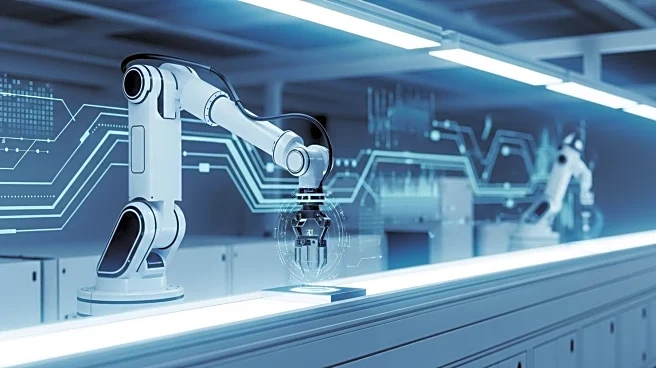What's Happening?
Manufacturers are increasingly investing in artificial intelligence (AI) and automation to enhance business operations and attract skilled talent. A recent roundtable discussion highlighted the need for manufacturers to rethink workforce strategies to remain competitive. Despite technological advancements, 65% of manufacturers are considered digital laggards, relying on outdated systems. The industry faces challenges such as technological disruption, cybersecurity risks, and climate change. To overcome these, manufacturers are creating new roles like AI engineers and digital supply chain analysts, aiming to make the sector more attractive to tech-savvy individuals.
Why It's Important?
The integration of AI in manufacturing is reshaping the industry, creating new career opportunities and enhancing operational efficiency. As manufacturers adopt AI, they must address the stigma of the industry being 'dirty, dark, and dangerous' to attract talent. The shift towards digital technologies is crucial for maintaining competitiveness and addressing challenges like cybersecurity and climate change. Companies that successfully integrate AI can improve productivity and sustainability, positioning themselves as leaders in smart manufacturing.
What's Next?
Manufacturers are encouraged to run AI pilot projects to assess the technology's impact and build momentum for broader adoption. Engaging employees in the AI journey is essential for building trust and ensuring solutions are effective. Companies like Schneider Electric are investing in pilot projects to enhance process efficiency and address operational challenges. The focus is on creating a culture of continuous learning and purpose-driven work to attract and retain talent in the age of AI.
Beyond the Headlines
The adoption of AI in manufacturing is not just about technology; it involves cultural and strategic shifts within organizations. Building trust and transparency in AI implementation is crucial for employee engagement and successful integration. The industry must address digital ethics and governance to protect morale and reputation. As AI becomes more prevalent, manufacturers must ensure their workforce is equipped with the necessary skills to leverage technology effectively.











